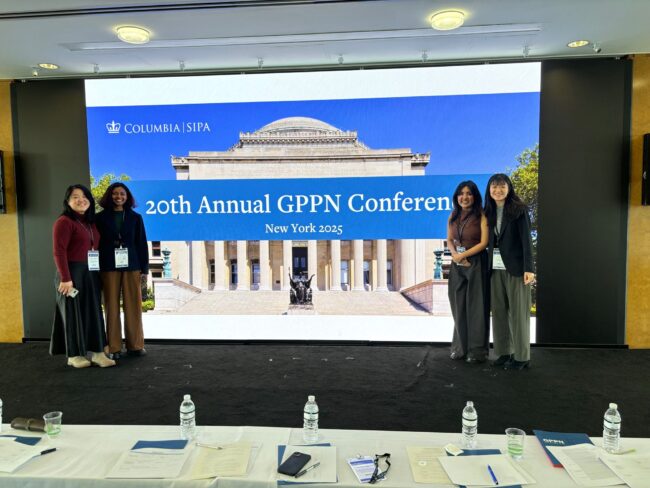During my time at the Columbia Climate School and School of International and Public Affairs as a student in the MPA in Environmental Science and Policy program, I had the privilege of studying alongside the brilliant women behind Clean Crop, a project that grew from classroom conversations into an ambitious startup idea.
What started as informal discussions quickly evolved into a shared commitment by Sara Haris, Celine Andriana, Erica Wu and Maitreyi Menon to address a major yet under-recognized climate challenge: methane emissions from rice farming in India. Rice farming is both a critical food source and a significant contributor to global emissions and water use. The founders’ interdisciplinary backgrounds, ranging from environmental policy and international development to impact investing, helped them see a path forward. “Working on Clean Crop helped me connect the dots between environmental policy and real-world agricultural solutions. It’s been exciting to move from ideas to action alongside a team that’s both sharp and mission-driven,” said Haris.

Traditional rice farming relies on continuous flooding of fields, which creates anaerobic conditions that emit methane, a greenhouse gas 28 times more potent than CO₂. In India alone, the scale of rice farming makes this a pressing concern for both climate and water security.
Solutions already exist. Techniques like alternate wetting and drying can reduce methane emissions by 35 to 48% and cut water use by up to 30%. But there’s a catch: Smallholder farmers often lack the upfront capital or access to markets that would make this transition economically viable. The problem isn’t technical; it’s economic.
“What matters isn’t just what’s technically possible, but what’s financially realistic for the people growing our food,” said Menon.
Clean Crop was born out of this realization. The team envisioned the startup as a supply-chain transaction advisor that could connect sustainable rice farmers directly with food companies seeking low-emission, climate-resilient produce. By working with farmer producer organizations (FPOs) in India, they are creating transparent, efficient and fair value chains that support both environmental goals and farmer livelihoods.
Their model provides financial and technical support to farmers adopting alternate wetting and drying, helps negotiate guaranteed purchase contracts with premium buyers, and offers services like quality verification, logistics coordination and market intelligence. By removing middlemen and streamlining transactions, Clean Crop ensures that farmers receive a fair share of the value-making sustainable practices an economically attractive option.
“Working on Clean Crop really showed me the potential we have in creating and implementing solutions that can benefit lives on the planet. While it takes time and effort, it is ultimately part of the process of truly understanding problems and specific ways to mitigate them,” said Wu.
The Clean Crop journey wasn’t without challenges. Participating in the Global Public Policy Network 2025 competition, where they represented Columbia and earned a finalist spot, and winning first place in the UPenn EcoVenture Challenge, gave the team crucial feedback. These experiences taught them that while climate impact matters, business model viability is key.
Originally focused on monetizing carbon credits, Clean Crop pivoted after realizing the carbon market often excludes smallholder farmers due to high transaction and verification costs. Their breakthrough came when they shifted from credits to market access: giving farmers real-time, premium-value contracts instead of deferred returns.
The team credits Columbia for helping them think systemically and practically. Their coursework in environmental policy, international development and impact investing offered them a holistic view of implementation challenges—why even well-intentioned policies may fail, and how success often depends on aligning incentives with existing institutions.
Rather than impose a new system, Clean Crop builds on trusted FPO structures already working in rural communities. Their interdisciplinary approach, blending policy, economics, sustainability and development, has shaped their mission from day one.
“Working on Clean Crop has shown me the power of building something from nothing; my teammates’ drive and sharp thinking constantly push us to improve and grow,” said Andriana.
Today, Clean Crop is building partnerships with food companies seeking verified sustainable rice. Their short-term goals include formalizing relationships with FPOs in key rice-growing regions, launching their advisory platform and facilitating supply chain coordination from farm to buyer. Long-term, they hope to expand to other crops and geographies, and to continue making sustainable farming the economically obvious choice.
As a fellow international student, I watched these women build something from nothing, with courage, empathy and an unwavering belief that solutions don’t have to wait. Their story is not just about rice or carbon or development; it’s about what happens when driven, thoughtful women co-create climate solutions from the ground up.
I hope this Columbia story inspires more students, especially women, to challenge conventional thinking, shape their realities and take bold steps toward solving the world’s most pressing problems.
Views and opinions expressed here are those of the authors, and do not necessarily reflect the official position of the Columbia Climate School, Earth Institute or Columbia University.


